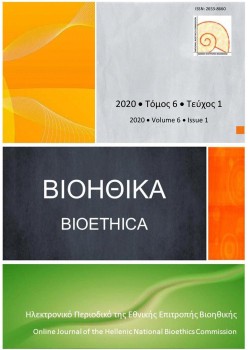Η εμπορευματοποίηση του ανθρώπινου σώματος
Résumé
Η ιατρική κοινότητα καλείται σήμερα να αντιμετωπίσει την έλλειψη διαθέσιμων προς μεταμόσχευση οργάνων με αποτέλεσμα την ύπαρξη μεγάλων λιστών αναμονής παγκοσμίως.Αυτός είναι και ο λόγος που προτείνεται από μία μερίδα της θεωρίας η εγκαινίαση ενός συστήματος αποζημίωσης για τους δότες, που θα λειτουργούσε εν μέρει ενθαρρυντικά. Μέσα από το υπό συζήτηση αυτό μοντέλο εισαγόμαστε λοιπόν στο πλέον αμφιλεγόμενο ζήτημα της εμπορευματοποίησης του ανθρωπίνου σώματος.
Η σκέψη αυτή πυροδοτεί μία σειρά από αντιδράσεις και προβληματισμούς, με ενδιαφέρον τόσο ηθικό όσο και κοινωνικό. Εν προκειμένω αντικείμενο της παρούσας δεν αποτελεί τόσο το θεωρητικό/φιλοσοφικό υπόβαθρο, όπου στηρίζονται οι ισχύουσες σήμερα ανά τον κόσμο νομοθετικές προβλέψεις. Στο βαθμό που γίνεται αναφορά στο κομμάτι αυτό, σκοπός είναι η ανάδειξη των αντιθέσεων ανάμεσα στις παγιωμένες πρακτικές και την εξεταζόμενη έννοια της εμπορευματοποίησης του ανθρωπίνου σώματος.
Πέραν των συμπαγών οργάνων αντικείμενο της διερεύνησης αυτής γίνονται και άλλα μέρη του σώματος, όπως είναι το αναπαραγωγικό υλικό και ο μυελός των οστών, η χρήση των οποίων γίνεται τόσο για θεραπευτικούς όσο και για ερευνητικούς σκοπούς.
Ακολούθως ζητούμενο είναι να αντιληφθούμε μέσα από την παράθεση ορισμένων φαινομένων, τι ακριβώς αφορά η έννοια της εμπορευματοποίησης καθώς και τον τρόπο με τον οποίο αυτή μπορεί να λειτουργήσει ευεργετικά μέσα σε ορισμένα πλαίσια ή αντιθέτως να προξενήσει μεγάλους κινδύνους.
Article Details
- Comment citer
-
Merkou (Μαρία Μέρκου) M. (2020). Η εμπορευματοποίηση του ανθρώπινου σώματος. Bioethica, 6(1), 17. https://doi.org/10.12681/bioeth.22620
- Rubrique
- Original Articles

Ce travail est disponible sous la licence Creative Commons Attribution 4.0 International .
Authors who publish with this journal agree to the following terms:
- Authors retain copyright and grant the journal right of first publication with the work simultaneously licensed under a Creative Commons Attribution CC BY 4.0 License, which allows for immediate free access to the work and permits any user to read, download, copy, distribute, print, search, or link to the full texts of articles, crawl them for indexing, pass them as data to software, or use them for any other lawful purpose. Appropriate credit must be given by citing the author(s) and the original publication in this journal.
- Authors are able to enter into separate, additional contractual arrangements for the non-exclusive distribution of the journal's published version of the work (e.g. post it to an institutional repository or publish it in a book), with an acknowledgement of its initial publication in this journal.
We encourage authors to deposit their articles, as well as data underlying the publications, in institutional and/or other appropriate subject repositories.
Bioethica permits and encourages authors to archive the final publication pdf in institutional (e.g. the repository of the National Hellenic Research Foundation) or other appropriate subject repositories (e.g. SSOAR repository for social sciences), in compliance with institutional and/or funder open access policies, after publication in the BIOETHICA. Authors must provide bibliographic details that credit publication in the journal, as well as related funding details (when applicable).
Lists of institutional and other subject-based academic open access repositories can be found listed by country at the registry http://opendoar.org/countrylist.php
If your institution does not possess a repository you may deposit a copy of your paper at no cost with www.zenodo.org , the repository supported for open access research in the EU by the European Commission, through the project OpenAIRE (www.openaire.eu )



